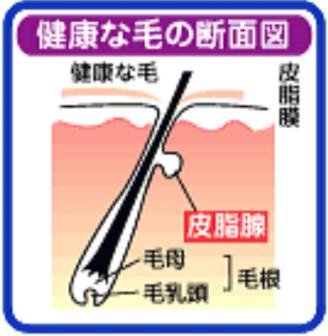Hi every body,
we had good discussion in the other thread and I have been trying to link info together and I have started to believe that hair loss (mpb and others) is all about the Sebaceous Glands.
1- If you want to have healthy hair, the glands must work in their normal way
2- We start loosing hair at 14 or 15 (increase of testosterone) beacuse our bodies start to produce the X-Factor that affect/infect how glands work or their size or the sebum they produce or …
3- The genetic part of mpb is about producing more of the X-Factor not about different structure of any body part including the glands themselves
4- The glands located at the top of the head are different (not necessary in structure but maybe there is a reason that they receive the X-Factor, maybe the location) than the back of the head.
5- People suffering mpb have similar glands (top or back) similar to healthy people who have full hair.
6- The proof of point 5, There are many examples of permanent and temporary hair loss for men not suffering mpb like taking Accunate (shrinks the glands),bodybuilding, etc… Hair loss occur at the top of the head with mpb or any other reason.
7- The x-Factor could be indeed prostaglandin since body-builders consume more of it.
8- To treat hair loss we need to start from the hair and the head not from the balls. Fin looks like reducing the X-Factor but in the wrong way. The X-factor could be good for your body and we just need to reduce it around the glands
9- Fin alone does not regrow hair and that’s why we use minox. Yes we don’t know how minox works but there are studies about the Tretinoin and how they work. It is believed that Tretinoin penetrate through the glands and regulate them and that’s could be why people can regrow some hair from using retinol and similar Tretinoin.
10- In some cases, if glands are infected they can’t regulate themselves. That’s normal in many sebaceous glands diseases. That’s why fin may not regrow hair alone (reducing the x-factor)
11- Regulating the glands does not mean stopping them from producing sebum. Sebum is good for your hair at normal level
12- More production of sebum may contains (or leads to ) bacteria that accelerate hair loss (Niz shampoo helps). On the other side, shrinking the glands to stop producing sebum result in hair loss as well (Accunate)
13- Men loose hair more when they get older (lower testosterone ). I read one study that the glands get bigger when we get older (abnormal state again)
14- There could be more than one X-Factor. The first one result in over-production of the glands and the other one result in shrinking the glands (both still abnormal) and that’s why we read (if true, I don’t know) that there are men with dry scalp suffer mpb.
15- Still most of men with mpb have oily scalp and dandruff. I don’t think we were born with dandruff in our head or oily scalp before the age of 14.
16- Food or natural habits have no serious effect on mpb IMO. We can see brothers at the same home eating the same food and having the same habits and one suffering mpb and the other don’t (my case)
17- Some HT doctors makes sure that the (healthy) glands are attached to the follicle when they perform HT operations!!
I believe that we can maintain/regrow some hair back by regulating how the glands works and cleaning the X-Factor around them without risking and should not be impossible or difficult to treat mpb. Stop talking about genetic or any abstract answer. I know and we all know it is genetic but what the heck, there is a science behind genetic issues
PGD2 is not a new discovery, if it is behind hair loss why it has been ignored?!!I don’t claim at any point I am right, just my 2 cents about hair loss (I don’t have medicine degree and my English is good only when reading IT books)
